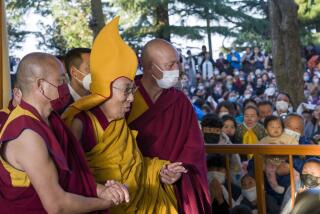Dalai Lama Sees Clinton but Delays Nod to China
- Share via
WASHINGTON — The Dalai Lama, the exiled Tibetan spiritual leader, won an audience here Tuesday with President Clinton and other top administration officials, but he postponed plans to unveil an initiative aimed at working out a rapprochement with China.
Instead, the Tibetan leader said he needs further talks with Beijing to make sure that any new peace offering will win a “positive response” from the Chinese leadership. U.S. officials said there is no sign yet that China and the Dalai Lama can make any headway in settling the differences that divide them.
Chinese troops have occupied Tibet for nearly five decades. In 1959, the Dalai Lama left Tibet for exile in India after an unsuccessful Tibetan uprising against Chinese rule. China considers Tibet to be an autonomous region, roughly akin to other Chinese provinces.
For decades, Chinese officials have accused the Dalai Lama of trying to separate Tibet from China. But during a visit by Clinton to Beijing in June, Chinese President Jiang Zemin appeared to mute his criticism of the Tibetan leader. He hinted that the door might be open to negotiations if the Dalai Lama would acknowledge that Tibet and Taiwan are both part of China.
“I’m not ready to make a public response” to Jiang, the Dalai Lama said Tuesday in an interview with The Times and other news organizations. “Sometimes, a low profile is useful.”
In a written statement, the Tibetan leader stressed his continuing desire for a settlement with Beijing. “With goodwill on both sides, with a commitment to nonviolence and reconciliation,” he said, “we can together bring peace and stability in Tibet and lasting harmony between the Tibetan and Chinese peoples.”
Since Jiang’s apparent overture, the Dalai Lama’s representatives have been exploring the prospects for a breakthrough with Beijing--one that might enable the exiled leader to visit China and open the way for Tibet to govern itself under Chinese rule.
But over the past few months, Chinese officials have revived the denunciations of the Dalai Lama they had been issuing before Clinton’s visit.
On Tuesday, Chinese Foreign Ministry spokesman Zhu Bangzao told reporters in Beijing: “The Dalai Lama has for a long time engaged in activities to split the motherland and preached independence for Tibet. . . . To this day, he has not repented. We ask U.S. leaders not to meet the Dalai Lama to avoid harming China-U.S. relations.”
Despite that warning, Clinton visited with the Tibetan leader Tuesday in the map room of the White House residence quarters. The session was officially hosted by First Lady Hillary Rodham Clinton, but the president stopped in for roughly half an hour.
“President Clinton expressed his strong support for efforts to foster a dialogue between the Chinese government and the Dalai Lama and his representatives to resolve differences,” the White House said in a written statement. “The president welcomed the Dalai Lama’s commitment to nonviolence and his efforts to initiate a dialogue with the Chinese government.”
Vice President Al Gore and Secretary of State Madeleine Albright held separate meetings with the Dalai Lama.
On earlier trips, the Tibetan leader was welcomed to the White House by Presidents Bush and Clinton.
In his written statement, the Dalai Lama made clear, as he has in the past, that he is willing to acknowledge China’s sovereignty over Tibet.
“I am not seeking independence for Tibet, nor do my actions seek its separation from the People’s Republic of China,” he said. “I am for autonomy, genuine autonomy, for the Tibetan people to preserve their distinct identity and way of life.”
He said that after any settlement, he would not want to hold any official position in Tibet. Instead, he told reporters, Tibet’s government officials should be elected.
The Dalai Lama’s views, which he labeled “my Middle Way,” have attracted as much criticism from Tibetan exiles, some of whom favor independence, as they have from China itself.
In the Himalayan town of Dharamsala, India, the capital of the Tibetan exile community, Tibetan refugees expressed divided views on how best to secure freedom for their homeland.
While people spoke with reverence of the Dalai Lama, many said they are growing impatient with their leader’s strategy of pursuing limited self-rule for Tibet through peaceful means. Some advocated a more confrontational approach to China and the goal of full Tibetan independence.
“We totally oppose any agreement [with China] short of full independence,” said Pema Lhundup, head of the Tibetan Youth Congress, which has emerged as a powerful force within the exile movement.
“If such an agreement were reached and His Holiness returned to China, we would not go back. We would stay and fight.”
Times staff writer Dexter Filkins in Dharamsala contributed to this report.
More to Read
Sign up for Essential California
The most important California stories and recommendations in your inbox every morning.
You may occasionally receive promotional content from the Los Angeles Times.










